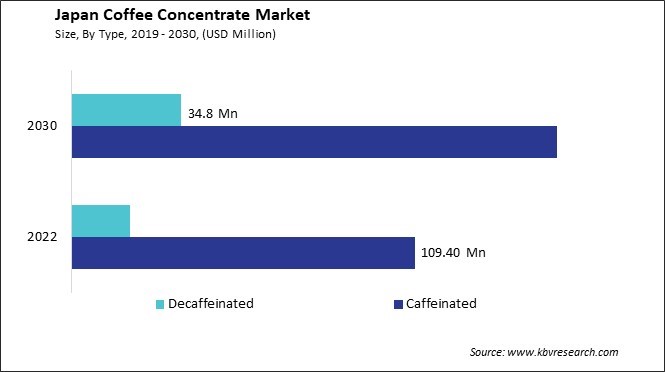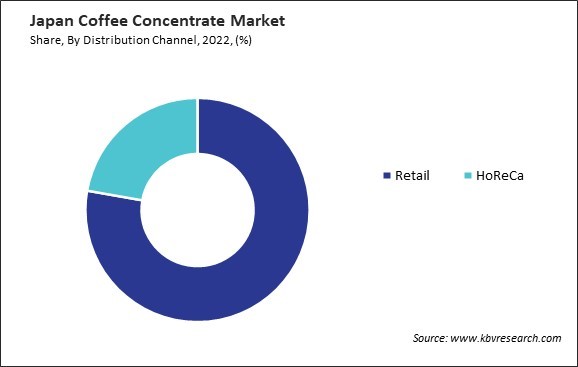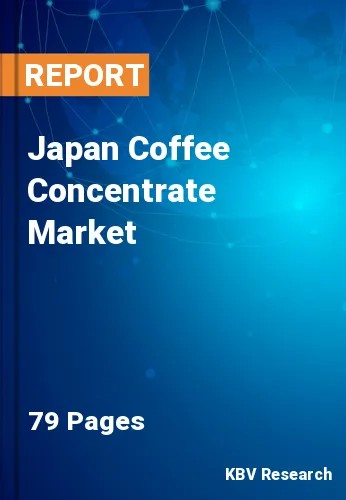The Japan Coffee Concentrate Market size is expected to reach $189.6 Million by 2030, rising at a market growth of 5.1% CAGR during the forecast period. In the year 2022, the market attained a volume of 3940.1 thousand litres, experiencing a growth of 5.2% (2019-2022).
The coffee concentrate market in Japan has witnessed significant growth in recent years, reflecting the nation's evolving coffee culture and the increasing demand for convenient and high-quality coffee products. With a rich history of tea consumption, Japan has undergone a noticeable shift in preferences, with coffee gaining popularity among consumers seeking diverse and sophisticated beverage options.

One key factor contributing to the success of coffee concentrates in Japan is the hectic urban lifestyle, prompting a surge in demand for on-the-go and instant solutions. Coffee concentrates provide a convenient alternative for busy professionals who desire a quick yet satisfying coffee experience. The coffee concentrate market has seen a proliferation of ready-to-drink coffee concentrate products, catering to the time constraints of the Japanese workforce.
Furthermore, Japan's emphasis on health and wellness has influenced the coffee concentrate market. Manufacturers have introduced cold brew concentrates, capitalizing on the perception that this brewing method offers a smoother taste and potentially lower acidity, aligning with health-conscious consumer preferences. Collaborations between coffee concentrate brands and local Japanese coffee shops have also contributed to the industry’s growth. These partnerships often result in limited-edition releases that attract consumers seeking exclusive and regionalized coffee experiences.
In the bustling landscape of Japan's coffee culture, a notable trend has emerged with the rising popularity of convenience stores as key players in the coffee concentrate market. Over the past few years, these ubiquitous convenience stores, known locally as "Konbini," have become focal points for consumers seeking convenient, high-quality coffee solutions. One driving force behind this surge in popularity is the fast-paced lifestyle of urban Japan, where time is a precious commodity. Convenience stores have capitalized on this by offering a quick and accessible solution for coffee enthusiasts. With most stores open 24/7, consumers satisfy their caffeine cravings at any time, aligning seamlessly with the on-the-go nature of modern Japanese life.
The Japanese penchant for efficiency and convenience has propelled the coffee concentrate market to new heights, with consumers increasingly turning to these readily available options in their daily routines. The bustling streets of Tokyo, Osaka, and other major cities now feature an array of convenience stores boasting a diverse selection of coffee concentrates, ranging from traditional drip coffee to trendy cold brews.
Moreover, convenience stores have invested in creating a unique and appealing coffee experience. Many establishments collaborate with renowned coffee brands or develop exclusive coffee concentrate lines catering to diverse tastes. This emphasis on quality and variety has elevated convenience store coffee to a level where it competes head-to-head with specialty coffee shops.
According to the Japan Franchise Association, the surge in the number of convenience stores in Japan was remarkable, escalating from 6,308 in 1983 to 58,340 in 2018. Japan's population of around 125 million translates to approximately one convenience store for every 2,170 people. This convenience store growth correlates with Japan's expanding coffee concentrate market. Thus, Japan's coffee concentrate market has witnessed a transformative trend as convenience stores emerge as central players, seamlessly integrating high-quality coffee solutions into urban consumers' fast-paced and efficient lifestyles.
Japan has witnessed a burgeoning interest in coffee culture, propelling the coffee concentrate market to new heights. Renowned for its rich history and meticulous attention to detail, Japan has seamlessly integrated the global coffee phenomenon into its cultural fabric, creating a unique and sophisticated coffee experience. The thriving coffee culture in Japan is not confined to the traditional café setting; instead, it permeates various aspects of daily life. The demand for convenience has led to the rise of ready-to-drink coffee concentrates, catering to the fast-paced urban lifestyle. This shift is particularly evident in the bustling streets of Tokyo and other major cities, where individuals seek a quick yet refined coffee experience that aligns with their busy schedules.
The Japanese penchant for precision extends to their coffee preparation, with a growing emphasis on quality and craftsmanship. This dedication is evident in the popularity of coffee concentrates, where the concentrated essence of coffee allows enthusiasts to savor the nuanced flavors and aromas with heightened intensity. This trend aligns seamlessly with Japan's culinary philosophy, where the pursuit of perfection is a revered tradition.
Japanese consumers, known for their discerning taste buds, are increasingly exploring diverse coffee profiles, from single origin concentrates to innovative blends. The coffee concentrate market reflects a fusion of traditional brewing methods and avant-garde techniques, appealing to a broad spectrum of coffee enthusiasts.
Moreover, the cultural significance of coffee in Japan goes beyond the beverage itself. Coffee houses serve as social hubs, where individuals gather to engage in meaningful conversations or find solace in a serene coffee ritual. This cultural shift signifies a departure from the conventional tea-centric landscape to a coffee-centric one, marking a paradigmatic evolution in Japan's gastronomic landscape. Hence, Japan's burgeoning interest in coffee concentrates reflects a meticulous blend of cultural tradition and modern lifestyle demands.

Japan's coffee concentrate market has witnessed significant growth in recent years, driven by changing consumer preferences and a growing demand for convenient and innovative coffee products. One prominent player in the Japanese coffee concentrate market is UCC Ueshima Coffee Co., Ltd. With a rich history dating back to 1933, UCC has established itself as a leading coffee company in Japan. The company offers a diverse range of coffee products, including concentrated forms, catering to consumers' evolving tastes. UCC's commitment to quality and innovation has positioned it as a key influencer in shaping the coffee concentrate landscape.
Another significant player is Key Coffee Inc., a company with a legacy of over 90 years in the coffee industry. Key Coffee has adapted to changing consumer trends by introducing coffee concentrates that provide a convenient and time-saving solution for coffee enthusiasts. The company's focus on sustainability and ethical sourcing has also contributed to its appeal among environmentally conscious consumers.
Nestlé Japan Ltd. has also substantially impacted the coffee concentrate market. Leveraging its global expertise, Nestlé has introduced innovative coffee concentrate products that align with Japanese consumers' preferences for high-quality and convenient coffee solutions. The company's commitment to sustainability and responsible sourcing resonates well with the environmentally conscious Japanese industry.
Asahi Group Holdings, known for its presence in the beverage industry, has ventured into the coffee concentrate sector. With a diverse portfolio, including coffee concentrate products, Asahi has capitalized on the rising demand for on-the-go coffee solutions. The company's strategic marketing and distribution channels have played a pivotal role in its success in the competitive Japanese coffee concentrate market.
Maxim's Japan Co., Ltd., a Dong Suh Foods Corporation subsidiary, has also made strides in the coffee concentrate segment. Maxim has quickly adapted to consumer preferences, offering various coffee concentrate options that cater to different taste profiles. The brand's marketing strategies and commitment to product quality have contributed to its growing presence in the Japanese coffee concentrate market.
Japan Tobacco Inc., primarily known for its tobacco products, has diversified into the coffee concentrate market through its coffee brand, "ZiNC." The company's foray into this sector reflects the growing popularity of coffee alternatives among consumers. Japan Tobacco's established distribution channels have facilitated the penetration of ZiNC coffee concentrates in the Japanese industry. These companies, with their rich histories, commitment to quality, and strategic adaptations to consumer trends, collectively shape Japan's coffee concentrate industry's landscape.
By Type
By Distribution Channel
Our team of dedicated experts can provide you with attractive expansion opportunities for your business.

